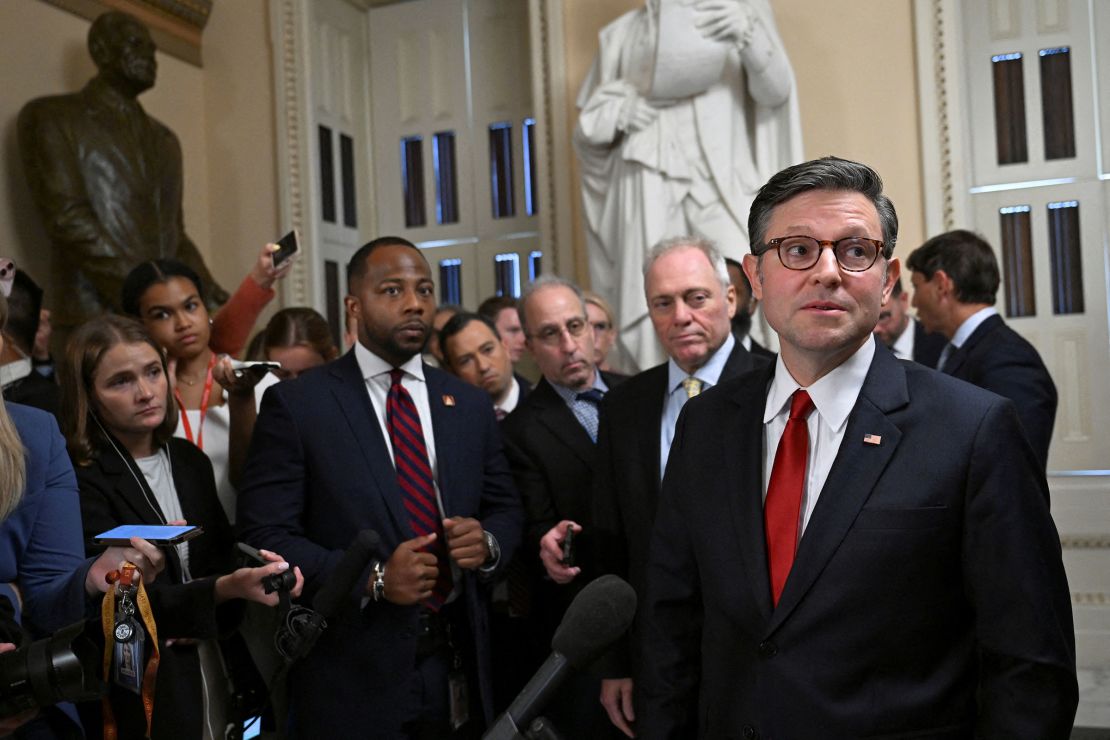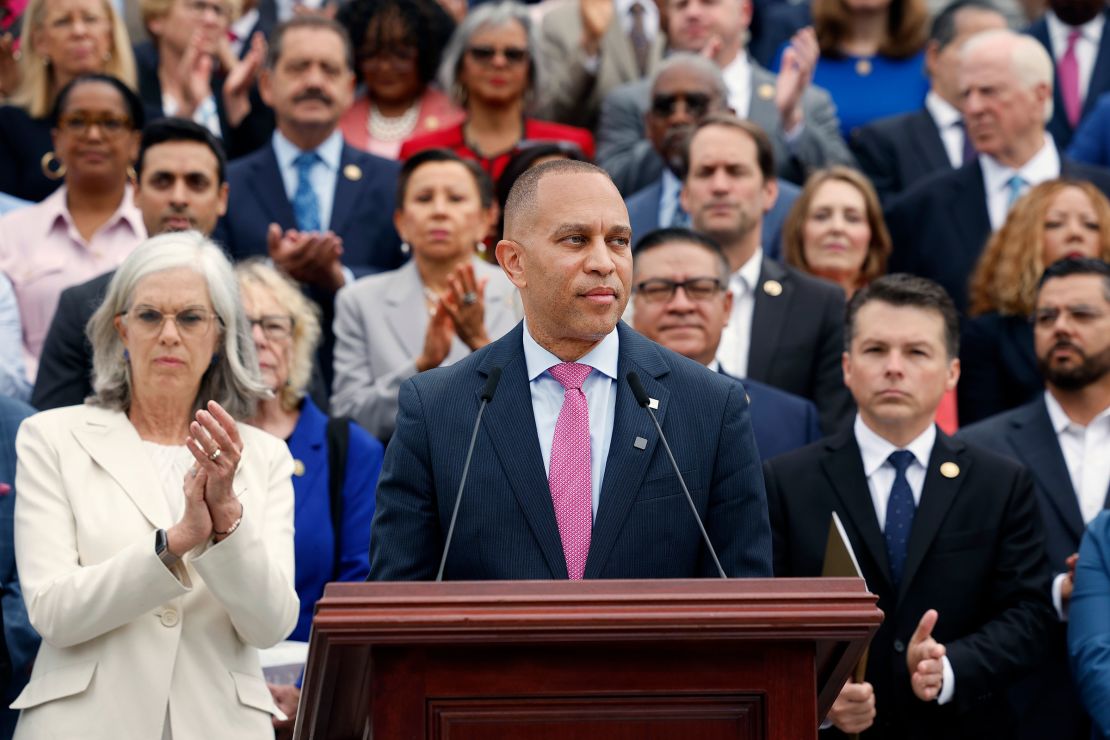CNN
—
Republican lawmakers have handed President Donald Trump the first major legislative achievement of his second term, following a fierce arm-twisting campaign by GOP leaders to unite a deeply divided party behind his sweeping domestic agenda.
House Republicans voted Thursday afternoon to approve Trump’s massive package of tax and federal spending cuts and funding boosts for the Pentagon and border security, clearing the bill to be sent to the White House for his signature. The Senate passed the bill earlier in the week.
The landmark victory for Republicans comes just six months into Trump’s second administration – a rapid timeline that appeared in question up until the final vote. The president and his Capitol Hill allies ratcheted up pressure on party holdouts in recent days, arguing the package will help cement Trump’s legacy on issues like immigration and tax policy – including making key campaign promises reality – while attempting to rein in spending with historic cuts to federal support for the social safety net.
“Only one man that can seal the deal,” Rep. Anna Paulina Luna said of Trump’s involvement in the final hours of the House’s push to pass the bill.
It’s also a significant win for House Speaker Mike Johnson and Senate Majority Leader John Thune, Congress’ top two Republicans, who are both relatively new to the leadership suites. What members have doubted for weeks will now happen: Trump will be able to sign his “one big, beautiful bill” by the Fourth of July.

With almost no room for error, the two Hill GOP leaders convinced nearly every member of their party to march in line behind Trump. They succeeded despite months of griping by fiscal hawks about exploding the deficit with a $3.3 trillion bill, and separately, concerns from more moderate members about cutting $1 trillion from Medicaid.
Ultimately, they lost two Republican votes on final passage in the House. Reps. Thomas Massie of Kentucky and Brian Fitzpatrick of Pennsylvania voted alongside Democrats against the measure.
The propelling force behind Republicans’ megabill was simple: Trump and his iron grip on the GOP.
The president made sure his package was centered around three of the most popular policies in the Republican party — addressing border security, bolstering the military and giving out tax cuts. It included some of his biggest promises from the campaign trail, including no taxes on tips or overtime pay, a funding boost for the Pentagon and billions of dollars to help fund a nationwide immigration crackdown. On border policy alone, the bill will open new detention facilities, pay for a hiring spree for border officers and fund hundreds more miles of Trump’s so-called border wall from his first term.
Those broadly popular policies helped convince House Republicans who had been highly skeptical of Trump’s bill.
Retiring Rep. Don Bacon of Nebraska, for instance, had warned his party he would not support more than $500 billion in cuts to Medicaid — though the final Senate bill would reduce federal funding to the program by $1 trillion, according to the Congressional Budget Office.
“Do I vote to protect people’s taxes from going up? Do I get our military protected? Do I improve our border security and take something that our hospitals?” Bacon told CNN on Wednesday, adding that he hoped Congress could still prevent some of the health care cuts from going into effect five years from now. “But, you know, I got a choice. What is going to provide more benefit?”
If Republicans blocked the bill, they would have faced the wrath of Trump — and also a painful reality on tax policy. Millions of Americans were set to see a tax hike next year after the GOP’s 2017 law expired, another powerful reason propelling the bill forward.
The bill is the result of more than a year of grueling behind-the-scenes work by GOP lawmakers and the administration that began even before Trump’s election in November.
Republicans muscled the package through both chambers with only three votes to lose in each.
By historical standards, the GOP-led Congress passed the bill in a remarkably quick fashion. Trump’s tax bill in his first term and President Joe Biden’s signature health care, tax and climate bill each took roughly 18 months of prolonged talks with Congress.
There was plenty of drama along the way. One key Republican, Sen. Thom Tillis, stunned Washington by announcing he would not seek reelection after defying Trump and voting to block his bill on the floor. (Within a day of Trump threatening to primary him, Tillis exited the race altogether.)
Other holdouts – both ultraconservatives and centrist-leaning members – spent weeks criticizing a bill on cable news hits and town halls that they ended up supporting in the end.
Trump and congressional GOP leaders, who had been caught flat-footed largely without a detailed policy agenda when Trump won in 2016, were prepared this time. House Republican leaders began holding “working group” sessions on tax, border and health policy in spring 2024, months before the election.

House Minority Leader Hakeem Jeffries has made clear that Democrats will make Trump’s agenda the centerpiece of their drive to flip the House next November.
And he made that even clearer on Thursday, just before passage of the bill, when he delivered a record-breaking more than 8-hour speech railing against Trump’s cuts to safety net programs in exchange for what he described as tax cuts for billionaire donors. During his floor speech, Jeffries read from several binders’ worth of attacks on Republicans.
“After project 2025 comes project 2026,” Jeffries declared on the floor.
Democrats plan to hammer how the bill will slash federal dollars for Medicaid, potentially jeopardizing health coverage for 11.8 million people, as well as cuts to the nutritional aid program SNAP.
House Majority Forward, the nonprofit affiliated with House Democratic leadership, is already working on ads hitting vulnerable Republicans for their vote, according to a person familiar with the plans. The ad campaign is expected to target multiple districts, including Reps. Scott Perry in central Pennsylvania, Tom Barrett in southern Michigan and Derrick Van Orden in western Wisconsin.
CNN’s Morgan Rimmer, Aileen Graef and Jim Sciutto contributed to this report.

